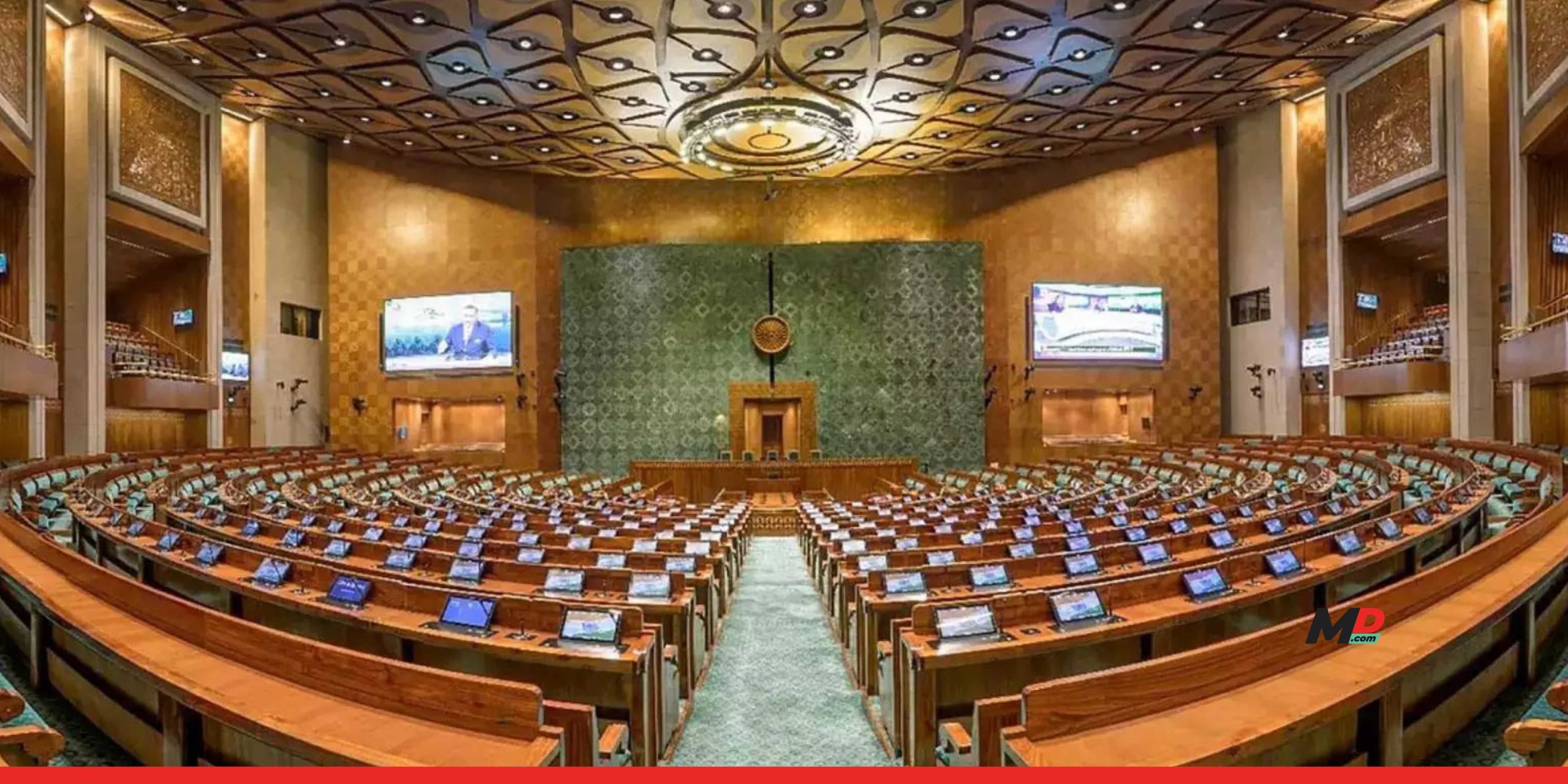Politics
The staggering wealth and sordid secrets of India’s political elite
Published
1 year agoon

In the realm of Indian politics, where power and influence reign supreme, a startling revelation has emerged – the vast majority of our esteemed Lok Sabha members are not just wielding the reins of governance, but also sitting atop veritable fortunes. A recent analysis by the Association of Democratic Reforms (ADR) has uncovered a jaw-dropping statistic: a staggering 93% of the winning candidates in the 2024 General Elections are “crorepatis” – individuals with total assets exceeding a staggering 1 crore rupees.
But the tale of our political elite doesn’t end there. Delving deeper into the data, the ADR’s findings paint an even more unsettling picture – not only are our lawmakers swimming in wealth, but a significant number of them also carry the burden of criminal allegations and convictions. In fact, a startling 46% of the newly elected Lok Sabha members have criminal cases registered against them, with 27 of them having been previously convicted.
As we navigate this labyrinth of opulence and depravity, one can’t help but wonder: have the hallowed halls of our democracy been transformed into a playground for the wealthy and the morally compromised?
The rise of the “Crorepati” candidates
The ADR’s analysis paints a clear picture – the Indian political landscape has undergone a remarkable transformation, with the influx of deep-pocketed candidates dominating the electoral landscape. In 2009, just 58% of the winning candidates were “crorepatis,” a figure that has since soared to an astounding 93% in the 2024 elections.
Among the victorious candidates, the distribution of wealth is equally startling. A staggering 42% of these “crorepati” lawmakers possess assets worth over 10 crore rupees, while another 32% boast a net worth between 1 and 5 crore rupees. The remaining 19% fall within the 5 to 10 crore rupee range, painting a vivid picture of the sheer financial might of our political elite.
The analysis also sheds light on the most financially endowed members of the Lok Sabha. Leading the pack is TDP’s Guntur candidate, Chandra Sekhar Pemmasani, whose total assets exceed a mind-boggling 5,705 crore rupees. Close on his heels are BJP’s Chevella winner, Konda Vishweshwar Reddy, with 4,568 crore rupees, and BJP’s Kurukshetra candidate, Naveen Jindal, with 1,241 crore rupees to his name.
While the majority of our lawmakers have amassed substantial fortunes, there are a few notable exceptions. The candidate with the least assets is BJP’s Jyotirmay Singh Mahato from Purulia, whose total wealth stands at a mere 5 lakh rupees. Closely following him are AITC’s Mital Bag from Arambag and SP’s Priya Saroj from Machhlishahr, with assets worth 7 lakh and 11 lakh rupees, respectively.
The alarming rise of criminality in Indian politics
As if the staggering wealth of our political elite wasn’t enough, the ADR’s analysis has also uncovered a deeply troubling trend – the increasing prevalence of candidates with criminal backgrounds securing seats in the Lok Sabha.
The data reveals a startling statistic – a staggering 46% of the newly elected Lok Sabha members have criminal cases registered against them. This figure represents a significant increase from previous years, with 43% in 2019, 34% in 2014, and 30% in 2009.
Even more concerning is the rise in the number of winning candidates facing serious criminal charges. These include offenses such as rape, murder, attempted murder, kidnapping, and crimes against women. The analysis shows that 31% of the victorious candidates have such grave allegations against them, a figure that has jumped a staggering 124% since 2009.
Adding to the disturbing picture, the ADR’s report also highlights the presence of 27 winning candidates who have been previously convicted in criminal cases. This includes four individuals charged with murder under Section 302 of the Indian Penal Code, and 27 facing charges of attempted murder under Section 307.
The ADR’s analysis paints a bleak picture of the electoral landscape, revealing that the chances of winning for a candidate with declared criminal cases stand at a staggering 15.3%, compared to just 4.4% for those with a clean background. This sobering statistic underscores the troubling reality that criminality has become a virtual prerequisite for political success in certain quarters.
The Parties and Their Tainted Candidates
The ADR’s findings also shed light on the distribution of criminal cases across various political parties, painting a nuanced and concerning picture of the state of our democracy.
Among the parties, 100% of the winning candidates from the Rashtriya Janata Dal (RJD) and the Indian Union Muslim League (IUML) have criminal cases against them. The Bharatiya Janata Party (BJP), the single largest party in the Lok Sabha, has 39% of its victorious candidates facing criminal charges, while the Congress party’s figure stands at 49%.
Other parties with a substantial proportion of winning candidates with criminal cases include the Samajwadi Party (57%), the All India Trinamool Congress (45%), and the Dravida Munnetra Kazhagam (59%). The Telugu Desam Party (TDP) and the Shiv Sena (UBT) also have 50% and 71% of their victorious candidates embroiled in criminal allegations, respectively.
The analysis also delves into the prevalence of serious criminal charges among the winning candidates of various parties. The BJP has 26% of its victorious candidates facing such grave allegations, while the Congress and Samajwadi Party have 32% and 46%, respectively. The Trinamool Congress, DMK, TDP, and Shiv Sena also have 24%, 27%, 31%, and 57% of their winning candidates with serious criminal cases.
The implications of wealth and criminality in Indian politics
The ADR’s findings paint a troubling portrait of the Indian political landscape, raising profound questions about the integrity of our democratic process and the moral fiber of our elected representatives.
The erosion of public trust
The dominance of wealthy and tainted candidates in the Lok Sabha threatens to erode public trust in the very institutions that are meant to serve the people. As the gap between the political elite and the common citizen widens, the risk of disillusionment and disengagement with the democratic process looms large.
The threat to good governance
The presence of financially and morally compromised individuals in positions of power poses a grave threat to the principles of good governance. The temptation of self-interest and the potential for abuse of authority could undermine the effective implementation of policies and the fair distribution of resources.
The perpetuation of inequality and injustice
The disproportionate representation of the wealthy and the criminally accused in the Lok Sabha raises concerns about the equitable representation of all segments of society. The marginalization of the economically and socially disadvantaged could further entrench existing disparities and hinder the pursuit of true social justice.
The erosion of democratic ideals
The proliferation of “crorepati” candidates and those with criminal backgrounds in the Lok Sabha challenges the very foundations of our democracy. The notion of a government “of the people, by the people, and for the people” becomes increasingly hollow when the political class is dominated by the affluent and the morally compromised.
Restoring Faith in Indian Democracy
As we grapple with the startling revelations about the wealth and depravity within the Lok Sabha, it becomes imperative to chart a course towards the restoration of faith in Indian democracy.
Strengthening electoral reforms
Robust electoral reforms, including stricter regulations on campaign financing and the disclosure of candidate assets and criminal records, could help to level the playing field and ensure the integrity of the electoral process.
Empowering voters with information
Equipping the electorate with comprehensive information about the financial and criminal backgrounds of candidates could empower citizens to make informed choices at the ballot box, thereby incentivizing political parties to field individuals of unimpeachable character.
Fostering transparency and accountability
Measures to enhance transparency in the functioning of elected representatives, coupled with robust mechanisms for public scrutiny and accountability, could help to bridge the gap between the political class and the common citizen.
Promoting ethical leadership
Cultivating a culture of ethical leadership, where the pursuit of public good takes precedence over personal gain, could inspire a new generation of political leaders who are driven by the principles of honesty, integrity, and a genuine commitment to the welfare of the people.
Reclaiming the promise of Indian democracy
As we confront the sobering realities unveiled by the ADR’s analysis, it becomes clear that the promise of Indian democracy is at a critical juncture. The dominance of the wealthy and the criminally accused in the Lok Sabha threatens to undermine the very foundations of our representative government.
Yet, in the face of these challenges, we must remain steadfast in our commitment to the ideals of equality, justice, and transparent governance. By embracing bold reforms, empowering the electorate, and nurturing a new breed of ethical leaders, we can reclaim the promise of a vibrant, inclusive, and truly representative democracy.
The road ahead may be arduous, but the stakes are too high to succumb to apathy or resignation. It is our collective responsibility, as citizens of this great nation, to ensure that the hallowed halls of the Lok Sabha are once again filled with individuals who are driven by a genuine desire to serve the people, rather than their own narrow interests.
You may like
-


The Preliminary Findings of Air India AI171’s Tragic Crash Paint a Disturbing Picture
-


Japan’s Petabit Internet Is Faster Than You can Possibly Imagine
-


Cursed or Collectible? Labubu Dolls Likened to Ancient Demon
-


Elon Musk Launches ‘America Party’, But is it A Political Pipe Dream?
-


IPL 2025 Suspended As India-Pakistan Tensions Escalate
-


“We Will Make Them Pay If…”: Pakistan’s Aggressive Threats Spark Regional Tensions


